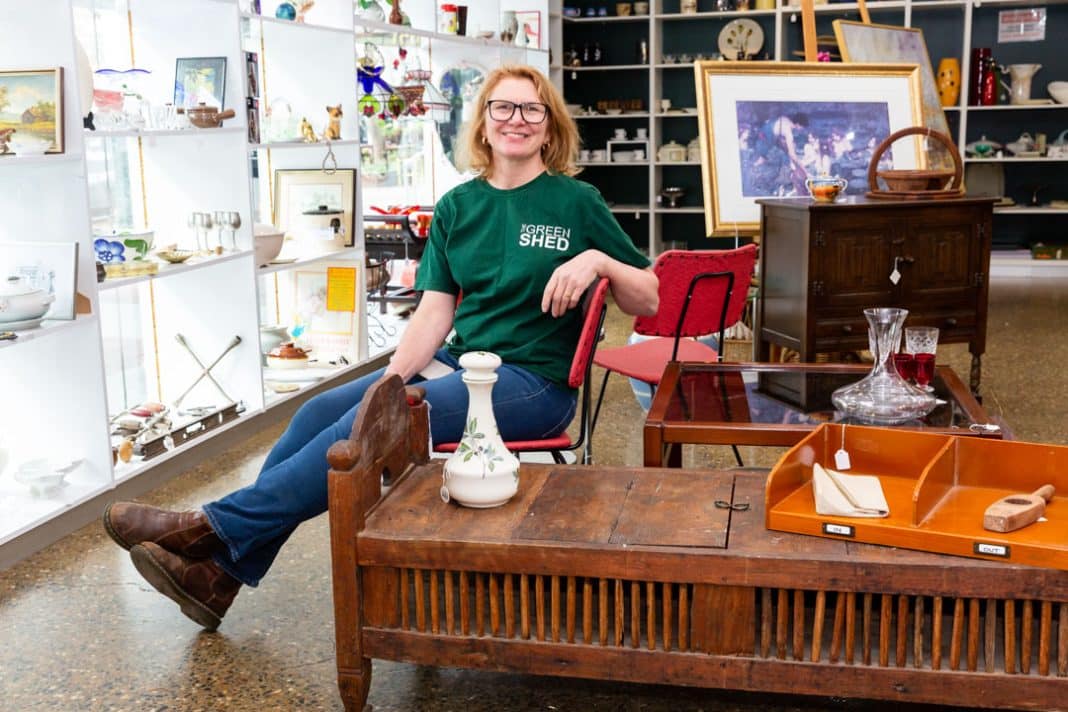The Green Shed at Mugga Lane is vast: 2,000 square metres inside and 4,000 square metres outside of books and bikes and beds and bric-a-brac, toasters and televisions, chairs and desks, DVDs and CDs, and mountains of clothes.
This is only one of four sites; there are another centre in Mitchell and two shops in Garema Place.
The amount of ‘stuff’ that comes through the Green Shed is not countable, co-founder Sandie Parkes says. Nor has it ever been weighed, although some guess it recovers 8,000 tonnes of waste a year.
“But that is a conservative guess,” Ms Parkes says.
Some reckon there are a million different items across the four sites, if you count every screw.
What’s given to the Green Shed?
“Everything that you see in every room, and in your office, and everywhere in the whole world. … You’ll find everything that you find in every shop in the world, and things that you will no longer find in any shop in the world.”
And everything brought to the Green Shed sells within a week (unless it gets broken or dirty), snapped up by thousands of visitors (20,000 visits recorded every week).
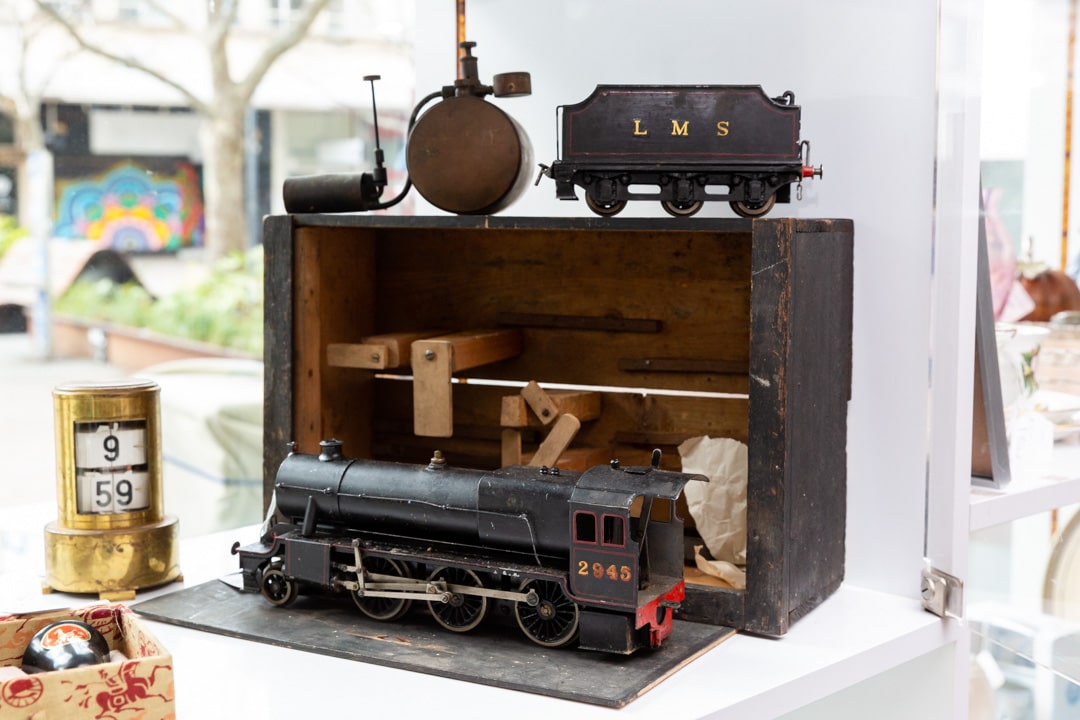
Staff used to unload items from trolleys; now, the items are on wheeled trolleys like portable shelves. They get taken apart within a couple of hours.
The Green Shed, “the first reuse centre in the world,” is the most productive, cheapest way of dealing with unwanted goods, Ms Parkes says. It is, she believes, the circular economy in practice.
“A reuse centre gives people an easy option to donate goods, giving them the chance for a second life or an alternative life [as something else], and thus continuing to use all of the energy that went into the production of that item.”
Greens MLA Jo Clay estimates the Green Shed offsets half the ACT’s carbon emissions from landfill – at no cost to the taxpayer. (The government provides the facility – the Green Shed pays for upkeep – and manages contracts.)
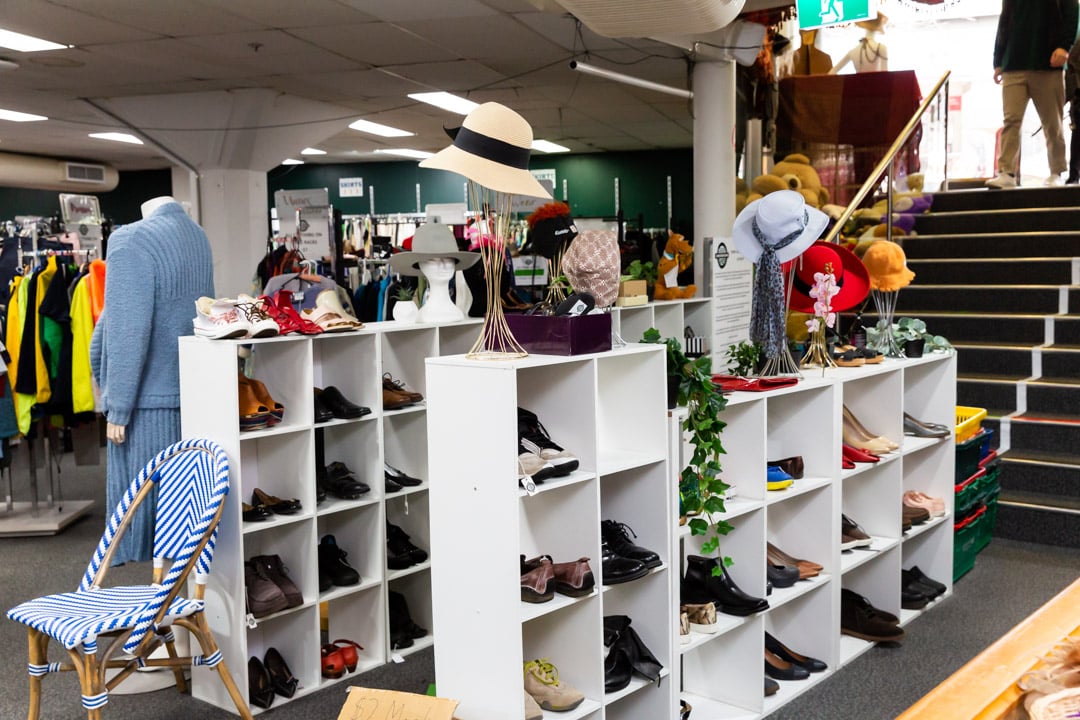
Many people buy things from the Green Shed, use them in their own business, or sell them elsewhere. One woman, for instance, buys bicycle wheels and parts, puts leadlight glaze on them, and sells them at markets.
Others use it as a toy library. Parents might buy their two-year-old a small bicycle, bring it back and get a bigger bike when the child turns five, and again when they turn 10.
Electrical goods come back, too. Staff often find they tested and tagged the same item eight years ago.
Some of it goes for free: schoolteachers take what they need for their classrooms; women escaping domestic violence, or kids moving away from their parents can get furniture.
“It doesn’t inconvenience us,” Ms Parkes said.
When you put out good, it just brings back so much good as well.
Over the last dozen years, the Green Shed has given $1.25 million to charities, too. The last Wednesday of every month is Charity Day.
“Every penny that comes across the counter goes into a charity bank account,” Ms Parkes said. When they reach $10,000, they donate it to a charity on their list. At the end of the year, they donate $10,000 plus whatever is left in the account to a children’s charity. (For the last two years, it has been Bravehearts.)
Some think the Green Shed’s customers are poor – but, Ms Parkes explains, they get all sorts.
“People just want to buy an alternative; they don’t want to buy new.”
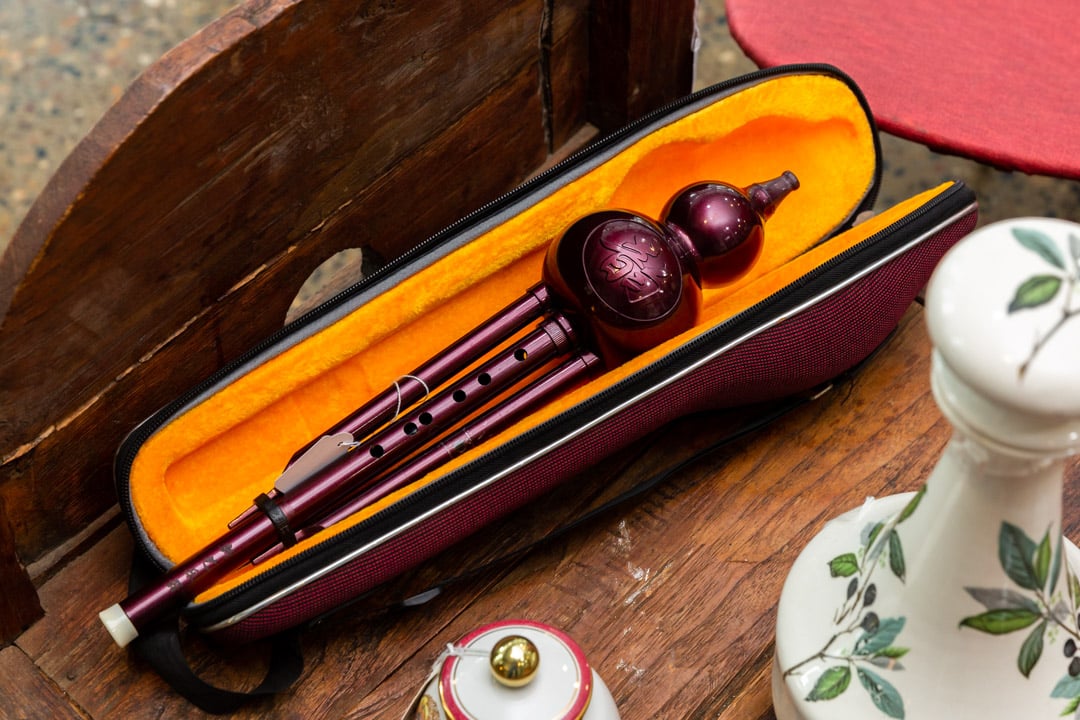
How the Green Shed was set up
The Green Shed was founded in 1988 as Revolve by Annie Kavanagh to conserve resources and create jobs for unemployed people.
Ms Parkes was there at the start. “We saw everything as a community resource, and we wanted to get as much as possible from the tip in order to create as many jobs as possible and benefit the community in that way.”
It took eight years to set up the Green Shed, Ms Kavanagh said in a 1995 interview, because it was unprecedented; nothing like it had been tried before.
After eight years lobbying the government, Ms Kavanagh’s jobless action group got permission to pick up items from the tip – Ms Parkes remembers walking next to bulldozers, picking up bathtubs – and bring them down to their yard.
“No shelter, nothing, just one little shed, so everything would be out in the rain,” Ms Parkes said.
Environmental consciousness was still new then. Ms Parkes came to Australia from London in 1986; she did not hear the word “recycling” until she came to Canberra, and no-one in the UK talked about it until the 1990s, she says. By that time, the ACT Government had set a world-first target of ‘No Waste by 2010’, and introduced kerbside recycling.
Ms Parkes was involved with the Green Shed until 2000. Disappointed that successive operators were not interested in the environmental and ethical potential, Ms Parkes and her husband Charlie Bigg-Wither secured the contract in 2010.
Now, Ms Parkes said, the Green Shed model is “a proven concept that could be replicated in any municipality around the world where people buy things” – and it has been, including in New Zealand and Queensland. The best, she thinks, is one in Tasmania, a government supported co-operative in Hobart.
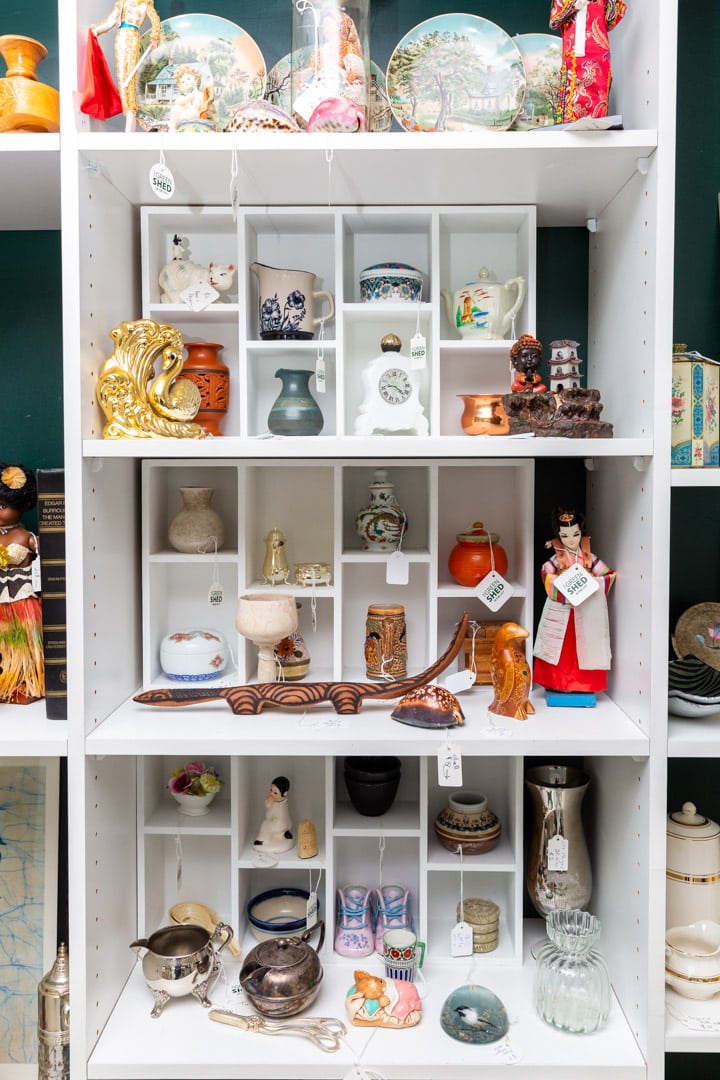
The Garema Place shops – one of them “a curated display of beautiful things” – attract public servants and city workers who would never come out to a tip, Ms Parkes said. The Green Shed Underground, the op shop near the bus interchange, brings the young generation in a way that nothing else does; college students send in at least one job application a week.
These days, the Green Shed employs 72 people – juniors, part-time students, writers and artists, people with disabilities, people who don’t want regular jobs but like the environment.
“It’s pretty challenging; it’s interesting,” Ms Parkes said. “You never know what’s going to come in the door next.”
Oddities and treasures
Last week, there were 14 wooden penises (not sex toys, but artistically made), tucked away in a desk drawer. Yesterday, it was a box of plastic egg– boiling cups: ‘No more unpeeling hot eggs,’ according to the box. You break the eggs into the cups, then cook them in water. Ms Parkes is baffled.
“Why would anyone do that when you can put it in the water straight after the shell? … Would you buy some plastic thing that you have to wash after?”
Exercise machines advertised on late night television appear at the Green Shed three months later.
Every Christmas, they take five or six wrapped presents; these days, they don’t even bother unwrapping them.
“They’re always a cup or a candle. … I’ve theorised that you could possibly just wrap a box, and give it to someone, and then they give it to us, and then we constantly move it round and round!”
Others are rescued historic treasures. The most wonderful thing the Green Shed ever found, Ms Parkes says, is an antique slide rule – one of only five known in the world. Its discovery “set the slide rule world on fire”, collectors told her.
Then there’s the Bible from Ballarat, presented to a soldier “With love from Mother, on Nov 11th 1915, on his departure from Australia”. The Bible was returned to the man’s daughter in November 2015, exactly 100 years to the day.
Some are tragic: a letter from a WWI captain, informing a soldier’s mother that her son has been killed in the trenches two hours before.
One of the latest finds is a box of WWII medals, without the recipient’s name. A medals expert will determine the owner, so the Green Shed can offer them to the family.
In the early days, Ms Parkes said, the Green Shed had never had a grand piano or a penny farthing. They’ve had two grand pianos in the last 12 years, but no penny farthings yet.
ALSO READ: Green Shed: Cutting down on waste in the circular economy
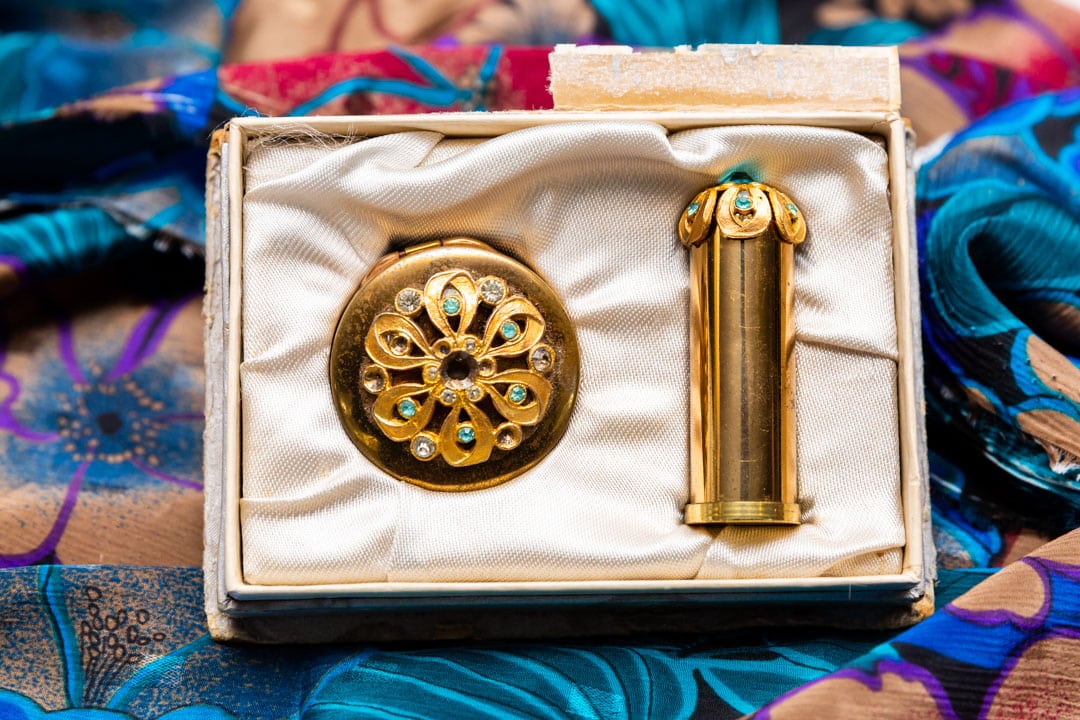
What’s your favourite find at the Green Shed? Tell us in the comments below.
Canberra Daily is keen to hear from you about a story idea in the Canberra and surrounding region. Click here to submit a news tip.

